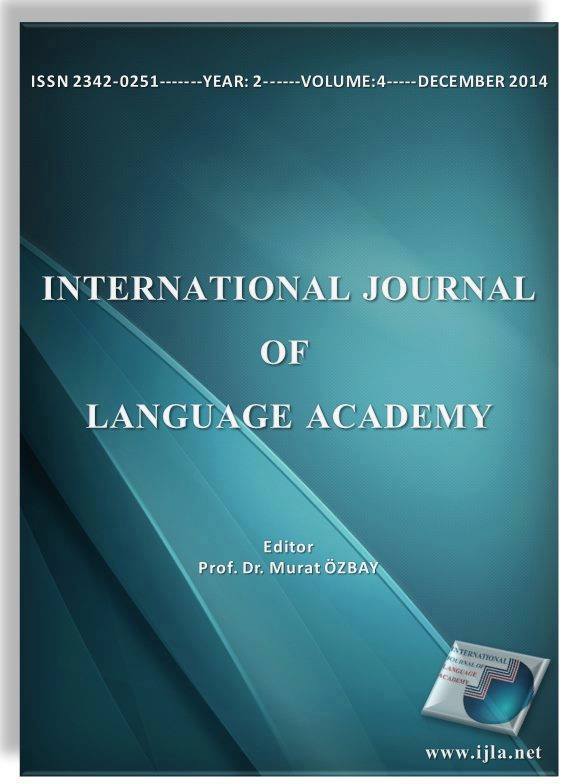Author :
Abstract
Bu çalışmada, Türkçe öğretmeni adaylarının dinlediğini özetlemede karşılaştıkları sorunlar ele alınmıştır. Çalışma, 2013-2014 öğretim yılında Gazi ve Mustafa Kemal Üniversitesi Türkçe Eğitimi Bölümü’nde okuyan dördüncü sınıf 202 öğretmen adayı ile gerçekleştirilmiştir. Çalışmada bilgilendirici, öyküleyici ve tartışmacı metin özetleri; başlık yazma, bakış açısını doğru kullanma, anlatım kipini doğru kullanma, önemli bilgiyi seçme, önemsiz bilgiyi silme, metin dışı bilgiye yer vermeme, tutarlı yazma ve kısaltma şeklinde belirlenen özetleme stratejileri açısından değerlendirilmiş, değerlendirme sonucunda özetleme konusunda yaşanan sorunlar tespit edilmiştir. Bu amaç doğrultusunda bilgilendirici, öyküleyici ve tartışmacı metinlerin her biri için ölçüt özet oluşturulmuş, analizler, araştırmacı tarafından geliştirilen “Özetleme Sorun Envanteri” kullanılarak gerçekleştirilmiştir. Ölçüt özete uyan kullanımlar başarılı olarak kabul edilmiş, uymayan kullanımlar, birer sorun olarak görülmüştür. Çalışmada, öğrencilerin özetleme konusunda yaşadıkları sorunlar şu şekilde tespit edilmiştir: Başlık yazmama, orijinalinden farklı başlık kullanma, özeti birden çok bakış açısıyla yazma, birinci tekil şahıs bakış açısı ile özetleme, birden çok anlatım kipi kullanma, tamamen yanlış anlatım kipi ile yazma, az sayıda önemli bilgi ile özetleme, çok sayıda önemsiz bilgi ile özetleme, birtakım metin dışı bilgilere yer verme, birbiriyle çelişen bilgilere yer verme, cümle ve paragraf geçişlerini yapmama, konu bütünlüğünü sağlayamama, çok uzun veya çok kısa yazma.
Keywords
Abstract
In this study, problems faced by pre-service Turkish language teachers during summarizing the texts listened were studied. The study was performed with 202 pre-service teachers studying at the fourth grade of Turkish Language Education department at Gazi University and Mustafa Kemal University in 2013-2014 academic year. In the study, informative, narrative and argumentative text summarizations were evaluated in view of summarizing strategies as writing title, using perspective in a correct way, using mode of expression properly, deciding on important information, erasing unimportant information, not including a non-textual information, coherent writing and abridgment. In the result of evaluation, the problems experienced in summarizing were determined. With this goal, criterion summary was created for each of the informative, narrative and argumentative texts, and analysis were carried out via “Inventory of Summarizing Problem” developed by the researcher.The uses matching up with the criterion summary were admitted successful and the different uses were seen as a problem. In the study the problems confronted by students about summarization were determined like these: Not writing a title, using a title different from the original, writing the summary from several perspectives, summarizing through the first-person singular perspective, using more than one mode of expression, writing with a completely wrong mode of expression, summarizing with very little important information, summarizing with a lot of unimportant information, included several non-textual information, including conflicting information, not doing sentence and paragraph transitions, not maintaining textual integrity, writing too long or too short.
Keywords
- Akbayır, S. (2006). Eğitim fakülteleri için cümle ve metin bilgisi. Ankara: Pegem Akademi Yayıncılık.
- Akman, A. T. (2006). Dikkat kimliğiniz çalındı. TÜBİTAK Bilim ve Teknik Dergisi, 461, 58-61.
- Anderson V., Hidi, S. & Babadoğan C. (1991). Özetlemenin öğrencilere öğretimi. Ankara Üniversitesi Eğitim Bilimleri Fakültesi Dergisi, 24, 587-594.
- Brown, A. L. & Day, J. D.(1983). Macrorules for Summarizing Texts. Journal of Verbal Learning and Verbal Behavior, 22, 1-14.
- Can, R. (2012). Ortaöğretim Öğrencilerinin yazılı anlatımlarında paragraf düzeyinde bağdaşıklık ve tutarlılık. (Yayımlanmamış doktora tezi). Gazi Üniversitesi, Ankara.
- Coşkun, E. (2005). İlköğretim öğrencilerinin öyküleyici anlatımlarında bağdaşıklık, tutarlılık ve metin elementleri. (Yayımlanmamış doktora tezi). Gazi Üniversitesi, Ankara.
- Çıkrıkçı, S. (2004). İlköğretim öğrencilerinde özetleme becerisinin gelişimi. (yayımlanmamış doktora tezi). Hacettepe Üniversitesi, Ankara.
- Dilidüzgün, Ş. ve Genç, Ş. (2014). Metin türü odaklı özet çıkarma çalışmalarının özet çıkarma becerisini geliştirmeye etkisi. İçinde K. İşeri, G. Çetinkaya, T. Çelik, S. Demirgüneş, T. Daşöz ve Y. Gençer (Ed.), Türkçe eğitiminde kuramsal ve uygulamalı çalışmalar. (s. 87-103). Ankara: Pegem Akademi Yayıncılık.
- Duffy, G. G. (2009). Explaining reading: A resource for teaching concepts, skills and strategies. Guilford Press.
- Emiroğlu, S. & Pınar, F. N. (2013). Dinleme becerisinin diğer beceri alanları ile ilişkisi. Turkish Studies, 8(4), 769-782.
- Gariboğlu, K. (1974). Örnekli kompozisyon bilgileri. Ankara: Gariboğlu Yayınları.
- Gökşen, E. N. (1969). Kompozisyon ilkeleri ve antolojisi. İstanbul: May Yayınları.
- Güneş, F. (2007). Türkçe öğretimi ve zihinsel yapılandırma. Ankara: Nobel Yayın Dağıtım.
- Güneş, F. (2013). Türkçe öğretimi yaklaşımlar ve modeller. Ankara: Pegem A Yayınları.
- Karaalioğlu: K. (1978). Ortaokullar için yazmak ve konuşmak sanatı kompozisyon. İstanbul: İnkılap ve Aka Basımevi.
- Karadağ, Ö. (2011). Yazma eğitiminde anlatım tarzları ve öğretimi. İçinde M. Özbay (Ed.), Yazma eğitimi.(s. 147-175). Ankara: Pegem Akademi Yayıncılık.
- Kaya, C. (1994). Fiillerde Kip Nedir? İçinde İ. Pala (Ed.), 99 soruda Türkçe kültürü. (s. 145- 146). İstanbul: Çocuk Vakfı Yayınları.
- MEB. (2005). İlköğretim Türkçe dersi öğretim programı ve kılavuzu. Ankara: Devlet Kitapları Basımevi.
- Newfields, T. (2001). Teaching summarizing skills: Some practical hints. English Teachers in Japan (ELJ) Journal, 2(2), 1-7.
- Özbay, M. (2009). Anlama teknikleri II: Dinleme eğitimi. Ankara: Öncü Kitap.
- Özdemir, E. (1992). Sözlü yazılı anlatım sanatı (Kompozisyon). İstanbul: Remzi Kitabevi.
- Par, A. H. (1983). Sözlü ve yazılı anlatım (Kompozisyona giriş). İstanbul: Serhat Yayınları.
- Taner, H. (2009). Geçmiş zaman olur ki. Kızıl saçlı amazon-Bütün hikâyeleri 1. İstanbul: Bilgi Yayınevi.
- Tekin, M. (2006). Roman sanatı ve romanın unsurları. İstanbul: Ötüken Neşriyat.
- Thompson, G. & Yiyun, Y. (1991). Evaluation in the reporting verbs used in academic papers. Applied Linguistics, 12(4), 365-382.
- Winograd, P. N. (1984). Strategic difficulties in summarizing texts. Reading research quarterly, (19)4, 404-425.
- Yakıcı, A., Yücel, M., Doğan, M. ve Yelok. (2008). Üniversiteler için Türkçe I yazılı anlatım. Ankara: Gazi Kitabevi.
- Yörük, Y. (1987). Güzel konuşma yazma kılavuzu. Ankara: Eğitim Yayınları.





